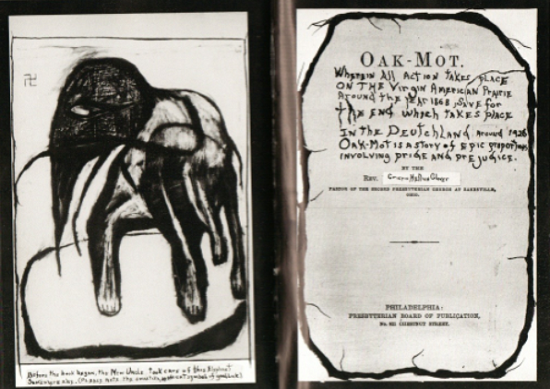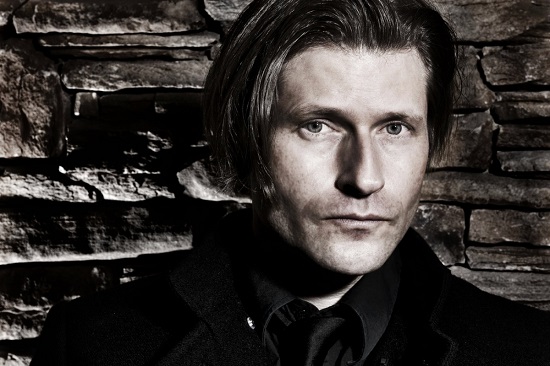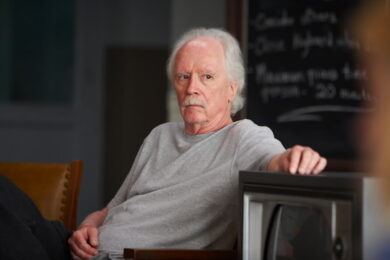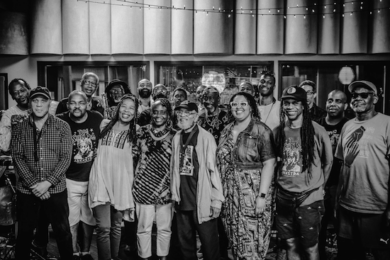Having been in the public eye for more than 30 years, Crispin Glover is one of the more instantly recognizable actors out there. From well-loved family fare such as Back To The Future, to the desperately obscure, Crispin has been in all manner of movies. What is less well-documented are the films he stars in and directs (What Is It? and It Is Fine! EVERYTHING IS FINE), as well as the multiple books he’s written (Oak Mot, Rat Catching, and Concrete Inspection). With Mr Glover soon to take his ‘Big Slide Show’ lecture out on a US tour, I asked him about the works close to his heart, and how he has managed to carve such a distinguished niche for himself.
What with the exclusive exhibitions of your films at your performances, as well as the visual elements of the Big Slide Show, do you think of yourself more as a multimedia artist, passively displaying your art; or as a showman, presenting your work in order to elicit reactions from the audience?
Crispin Glover: I consider what I am doing to be following in the steps of vaudeville performers. Vaudeville was the main form of entertainment for most of the history of the US. It has stopped being the main source of entertainment, but that does not mean that this live element mixed with other media is no longer viable. In fact I think that it is sorely missed.
I am aware that I’m utilizing the fact that I am known from work in the corporate media. This is something I rely on when I go on tour with my films. It lets me go to various places and have the local media cover the fact that I will be performing a one hour live narration of eight different illustrated books which are projected as I go through them, then showing one of my films and then having a Q and A and a book signing. As I funded the films I knew that this was how I would recoup my investment even if it would be a slow process.
I’m very suspicious of working with corporations as a business model. There are benefits and drawbacks to self distributing my own films. In this economy it seems like touring with the live show and showing the films with a book signing is a good basic safety net for recouping the money I have invested in them.
There are other beneficial aspects of touring with the shows other than monetary elements.
The benefits are that I’m in control of the distribution and personally supervise the monetary intake of the films. I also control piracy in this way. It is enjoyable to travel and visit places, meet people, perform the shows and have discussion with the audiences afterwards. The forum after the show is a very important part. The drawbacks are that it takes a significant amount of time and energy to promote and travel and perform. Also the amount of people seeing the films is much smaller than if I were to distribute them in a more traditional sense.
When creating your books (which you then narrate at your live shows), do the images you use create the narrative, or do you find them after you have the outline?
Crispin Glover: The books were made for my own pleasure starting about 10 years before I had the slide show.
The live aspects of the shows are a large part of how I bring audiences in to the theatre and the majority of how I recoup is by what is charged for the live show and what I make from selling the books afterwards.
For ‘Crispin Hellion Glover’s Big Slide Show’ I perform a one hour dramatic narration of eight different books I have made over the years. These are taken from old books from the 1800’s that have been radically changed from what they originally were. They are heavily illustrated with original drawings and reworked images and photographs.

I started making books in 1983 for my own enjoyment. I had always written and drawn and the books came as an accidental outgrowth of that. I was in an acting class in 1982 and down the block was an art gallery that had a book store upstairs. In the store there was a book for sale from the 1800’s that someone had drawn their artwork inside. I thought this was a good idea and set out to do the same thing. I worked a lot with India ink at the time and was using it on the original pages to make various pieces. I have always liked words in art and left some of them on one of the pages. I did this again a few pages later and when I turned between them I noticed that a story had started to naturally form. When I was finished with the book I was pleased with the results and kept making more of them. I made most of the books in the 80’s and very early 90’s. Some of them utilize text from the binding it was taken from and some of them are completely original text. Altogether, I made about twenty of them. When I was editing my first film What is it? There was a reminiscent quality to the way I worked with the books because as I was expanding the film in to a feature from what was originally going to be a short, I was taking film material that I had already shot and re-purposing it.
When I first started publishing the books in 1988 people said I should have book readings. But the books are so heavily illustrated that the only way for them to make sense live was to have visually representations of the images. This is why a slide show was necessary. It took a while but in 1992 I started performing the show. The content has not changed since I first started performing it but the performances have become more dramatic as opposed to a straight reading.
With your films, how important is the music? Is it decided on during production, or based on whatever seems best in post?
Crispin Glover: Each film is different. Some of the music is thought of in advance and some of the music comes in during the editing.
I listen to a lot of music that does not have any words and get great imagery from that. Directing is only a part of the whole film making process. Probably my favourite parts are the writing and the editing. I particularly like the sound editing and music is a huge part of that. Editing as a whole is where the true art of film making comes in to play.
The music that was selected for both What Is It? and It Is Fine! EVERYTHING IS FINE. had to appeal tunefully and melodically and fit the characters emotionally. Being that What is it? was specifically dealing with the constraints that have been imposed corporately in the last 30 years it made sense to utilize music that would not normally be selected within those corporate constraints.
Are there any more stories you want to film?
Crispin Glover: I recently started shooting my third feature film, a project I have been developing for many years. It is the first time my father Bruce Glover and I have acted together. We started shooting in October. I have 20 minutes edited together and will be showing 10 minutes of the film at the Music Box Theater in Chicago.
What is it about the stories you direct that appeals to you?
Crispin Glover: I like it when there is a little bit of something in actual life that the film documents, but that is hard to say definitively. I usually give the broad definition that my films are ‘dramas with humor’.
How has your time in the Czech Republic influenced your creative work?
Crispin Glover: I have owned my château in the Czech Republic for 10 years now and it has been a lot of work to get it ready for housing the crew members and cast when I am shooting my own productions.
When people hear I am going to my château they always say “Have a great time!” as though I’m going on vacation, but I have to do way more work here than in my house in LA. I have experienced culture shock on multiple occasions while here. There are differences that can take getting used to for an American like myself and it does affect how the production goes, but it was something I decided to make work many years ago and I have found that it is the least expensive way for me to finance a high quality production.
As someone who has done a great deal of self-production and self-promotion what advice can you offer artists who would like to take a similar approach?
Crispin Glover: I have been learning how to do it as it comes along. When I first showed What is it? in Los Angeles, I was advised by the publicist there to start a MySpace page. Of course MySpace has stopped having influence and FaceBook has become popular, but there seem to be other social media that are important as well. I don’t enjoy the continual shifting of social websites, and I’m not as on top of it as I probably should be. At the same time, I have seen the influence of these social media sites as being very influential to the attendance of my shows.
Do you find your work, especially your films, is more about exposing essential ‘truths’, or about creating heretofore unseen stories?
I’m a student of ‘Hero’s Journey’ structure or ‘Monomyth’ as Joseph Campbell called it. I understand story structure as being the element that is utilised to put forth the concept that needs to be illustrated. The great thing about sticking with Hero’s Journey structure is it helps to pull the writer’s subconscious intentions in to the story. This is what Campbell recognized about patterns of myths.
The best stories are an individual’s way of expressing their subconscious experience. If the subconscious is reached in one way or another then there is always some kind of universal truth that is revealed.
Crispin Glover will be touring with his Big Picture Show in the following locations:
Chicago, IL (Music Box Theatre)-January 31st
Grand Rapids, MI (Urban Center for Contemporary Arts)-February 2nd
Chicago, IL (Des Plaines Theatre)-February 6th
Kalamazoo, MI (Alamo Drafthouse)-February 8th, 9th
Dallas, TX (Texas Theatre)-February 15th, 16th
Yonkers, NY (Alamo Drafthouse)-February 18th, 19th
Ottawa, ON (Mayfair Theatre)-February 28th, March 1st
Encinitas, CA (La Paloma Theatre)-March 7th, 8th.
Further information can be found at his website, www.crispinglover.com





